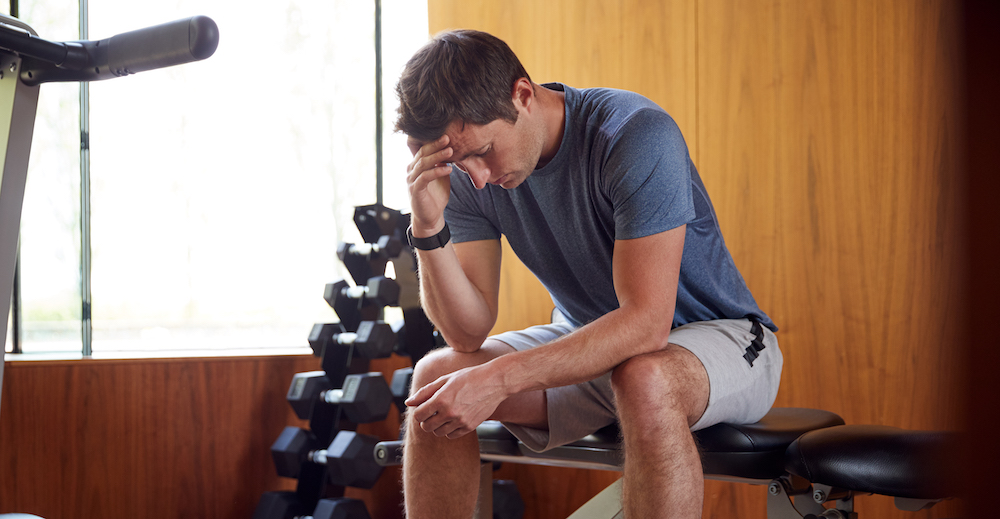
Is Your Exercise Routine Making You Anxious?
However, given how truly beneficial exercise can be, mental health experts say that ditching your shoes forevermore isn’t always the answer. Here, therapists who specialize in the connection between exercise and mental health explain why, for some, working out can be anxiety-inducing and the best ways to overcome it. Because, according to them, it’s absolutely possible to turn working out from something that causes anxiety to something that calms it.
Pinpointing the root issue that’s causing your anxiety while exercising
Sepideh Saremi, LCSW, the founder of Run Walk Talk, which combines a therapy session with running or walking, says people with a history of panic attacks can often feel anxious when exercising. That’s because the physical changes that happen to your body while you’re working out—shortness of breath, a fast-beating heart, sweating—mimic symptoms of anxiety. “It can start to feel [physically] similar to their panic attacks and take them back to their mindset at that time,” she says.
The same way that our minds retain information about past experiences and what we’ve been through, so too, do our bodies log memories of past experience. There are neural explanations as to why: The same way that we have five senses for perceiving the outside world, our internal body has “senses” that help to alert the brain to respond to specific stimuli. The vestibular system, which is located in the inner ear and brain and helps to modulate movement, works in close proximity with the limbic system, which controls our body’s autonomic nervous system (the body’s fight or flight command center) as well as emotional response, memory, and learning.
When you put the body into “flight” mode to run a few miles or catch a spin class with friends, this can cause the body to go fast and the mind to pick up the pace with anxious or racing thoughts as well. In many ways, our bodies are biologically programmed to respond to stimuli, and whether there’s a lion chasing us or a Run Club Challenge to conquer, our brains aren’t always fully capable of separating the motion of run from the reality of threat. That’s why some studies have found that, in patients with a history of panic disorder, exercising caused a spike in anxious thoughts.
Fears of physical limitations, too, can cause anxiety to spike. If someone has heard of a loved one, or someone in the news, experiencing a heart attack or another health problem while exercising, it can cause a fear of that happening to them as well. As soon as their own heart rate starts to increase, they can become preoccupied with the worry that it’s a sign of a heart attack. Elion also says if someone has experienced a health issue while exercising in the past, they can become consumed with worry that it will happen again.
Sports psychologist Julie Elion, founder of the Center for Athletic Performance Enhancement, says exercise-induced anxiety isn’t uncommon in those with pre-existing conditions. “It’s something I hear quite often from people who are over 50—or even 40—and have concerns about heart health,” she says. This is why her very first piece of advice is to get a check-up from a doctor, getting the all-clear before working out. “This will provide peace of mind that you don’t have any health issues and you’re physically able to withstand exercise,” Elion says.
What to do if anxious thoughts occur during workouts
No advice can ever take the place of a mental health expert who knows your exact experience, so if you’re feeling anxious, make sure to consult with a licensed professional first and foremost to get to the root of your stress and anxiety. There’s no simple fix to relax the mind; however, in a given workout there are things you can do to ease anxiety so that you can reap the benefits in the long run.
Elion suggests listening to music or a podcast as a way to relax your mind. Saremi co-signs this, but only coupled with doing the deeper work of finding the core reasons for your anxiety, which she emphasizes is most important. “Distraction is a really great short-term strategy, but if it’s a recurring problem, it’s not necessarily going to help you actually face the problem and learn to cope with it,” she says.
Part of the solution to overcoming anxiety during exercise is getting to the root cause of why you’re feeling anxious. (Yep, that means you might even want to book yourself some therapist time—even virtually.) There are ways to cope in the moment, but if you don’t get to the root of why you feel stressed or anxious, it will become a recurring issue.
Experts say working out with a friend (can anybody say Semi Private Training?) can also be helpful. It’s is a great thing to do because working out with someone that you feel comfortable with and that if you do start to panic they feel okay being there for you can be really powerful. Working out with someone provides the assurance that if something does go wrong, or you start to feel anxious, you won’t be alone.
You also might be able to curb your feelings of anxiety by switching up your workout. If the feeling of your heart starting to beat faster makes you feel anxious, try lower-impact workouts instead. Movement is really key for managing anxiety but it doesn’t have to be high-impact. Exercises like yoga or Pilates can be incredibly beneficial for both physical and mental health.
One exercise expert recommends a grounding exercise to try in the moment while working out: Notice five things you can see, four things you can feel, three things you can smell, two things you can hear, and one thing you can taste. When incorporating your senses into your exercise, you can re-train the body to respond to fitness in a more calming and stress-relieving way.

Leave a Comment
(0 Comments)